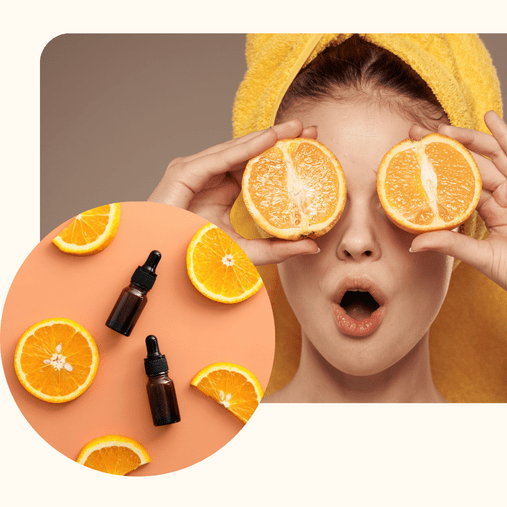
Ingredient Vitamin C
When I think of vitamin C, I first think of citrus fruits like oranges or lemons. These bright, juicy fruits are practically the epitome of vitamin C. This is complemented by images of a strong immune system and the idea of preventing colds—the "classic" idea when thinking of vitamin C.
And you? What comes to mind first? Perhaps fresh smoothies or a crisp salad with bell peppers?

Vitamin C is also one of the trendiest cosmetic ingredients of late. It's touted for its powerful antioxidant and brightening properties. Since we're getting questions from you about whether and which products containing this ingredient we recommend, we're taking a closer look at vitamin C in skincare products today.
What is vitamin C?
Vitamin C, also known as ascorbic acid, is an essential vitamin for our health and is found in large quantities in fruits and vegetables.
- Function : It plays a key role in tissue repair and growth in the body. It also aids in collagen production, which is important for skin, bones, and blood vessels.
- Antioxidant effect : Vitamin C protects cells from damage caused by free radicals caused by stress, environmental pollution and other factors.
- Immune system : It helps strengthen the immune system by supporting the production and function of white blood cells.
- Iron absorption : It improves the absorption of non-heme iron from plant sources, which is especially important for people who eat little meat or are vegetarians.
- Deficiency symptoms : A deficiency of vitamin C can lead to scurvy, a condition characterized by fatigue, bleeding gums, and poor wound healing.
Fun fact: Since our bodies, unlike most animals, cannot synthesize vitamin C, we rely on external sources, primarily through our diet. Good sources of vitamin C include citrus fruits, peppers, tomatoes, and green leafy vegetables like spinach and broccoli.

Myths about Vitamin C
One of the biggest myths about vitamin C is that vegetable oils or essential oils contain vitamin C. Although this belief is widespread on the internet, it is not true.
Although certain fruits and vegetables are indeed rich in vitamin C, the vitamin doesn't migrate into oils. This is because vitamin C (L-ascorbic acid) is water-soluble and therefore cannot be found in vegetable oils.
Take rose hips, for example. While rose hips are known to contain vitamin C, rosehip oil does not. The oil has great benefits for the skin, but vitamin C isn't one of them. That's why it's so important to research the ingredients and the scientific background, while also paying attention to marketing claims.

In addition to its health benefits, vitamin C (L-ascorbic acid) is an antioxidant found both inside cells (intracellular) and outside cells (extracellular) in the skin. It works in conjunction with vitamin E, a fat-soluble vitamin embedded in the cell membrane. Together, they prevent the fats in the cell membrane from being damaged by harmful processes such as oxidation.
Vitamin C is said to stimulate collagen production and contribute to an even skin tone. While L-ascorbic acid (pure vitamin C) is the most biologically active form of vitamin C, it is also the most unstable and therefore difficult to formulate in products and can sometimes cause skin irritation.
Pure vitamin C oxidizes in air and loses its potency, causing the solution to turn yellow. Therefore, it doesn't work well in a cream.
Likewise, vitamin C serums in bottles with a dropper are not ideal, as air regularly gets into the product when opened. Some companies' marketing often overprices pure vitamin C in high concentrations (15-20%) in dropper bottles. The serum loses its effectiveness after a few days.

More stable derivatives such as ascorbyl palmitate or ascorbyl glucoside (naturally derived derivative) are used in concentrations of 0.2% to 5%, but are less effective and less researched.
A vitamin C concentration that is too high (> 20%) can have a pro-oxidative effect and promote the formation of free radicals.
Are vitamin C products worth the hype?
- Vitamin C is a powerful antioxidant that can help protect the skin from UV damage and free radicals, brighten it, and reduce pigmentation spots.
- If you use vitamin C products, your skin will be even more susceptible to UV radiation and an SPF of at least 30, preferably 50, is a daily must.
- Not all vitamin C is the same. Pure vitamin C is chemically very unstable and, despite concentrations of 10-20%, only reaches a small amount in the skin.
- Vitamin C derivatives are used in significantly lower concentrations but are more stable.
- Pay attention to the exact INCI name of your vitamin C product and the packaging the product comes in. Pump caps or ampoules are better than pipettes, for example.
However, the actual benefits depend on the quality of the serum, the concentration of vitamin C, and the stability of the formulation and packaging. Not all products on the market are equally effective, and some can cause irritation on sensitive skin.
Whether you can use a vitamin C serum several times a week or daily depends on your skin and the product:
- Daily use : Serums with a high concentration tend to have an acidic pH and may be too demanding for sensitive skin when used daily. For well-tolerated serums, daily use may be beneficial, especially if you want to treat dark spots or prevent environmental damage.
- Every 2-3 days : If your skin is sensitive or you use a more concentrated serum, less frequent application may be sufficient to avoid irritation.
- Vitamin C derivatives are more tolerable , less acidic, and more stable than ascorbic acid, making them easier to use. However, they are potentially less effective because they must first be metabolized in the skin.
It's important to pay attention to your skin's needs. If you're unsure, start slowly and observe how your skin reacts.
Because, as we all know, less is often more. Don't overload your skin with a cocktail of super active ingredients every day. If your skin gets out of balance, we have these tips for you.
Sources: 1. Modern Cosmetics - Ingredients of natural origin, Dr. Damjan Janes 2. Natural cosmetic raw materials, Heike Käser 3. Formula Botanica
Photos by Alex Lvrs / homeandfleur / hello aesthe










Leave a comment
This site is protected by hCaptcha and the hCaptcha Privacy Policy and Terms of Service apply.